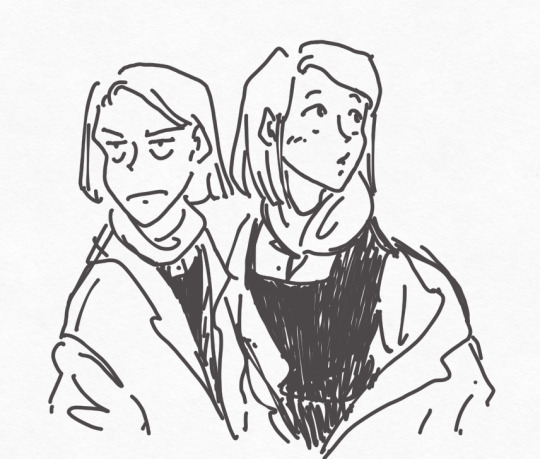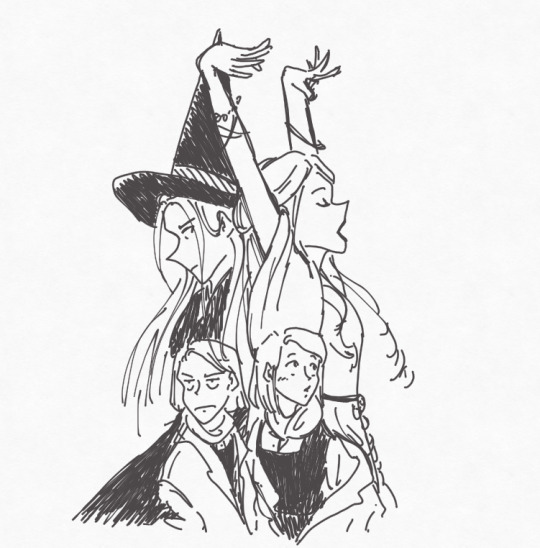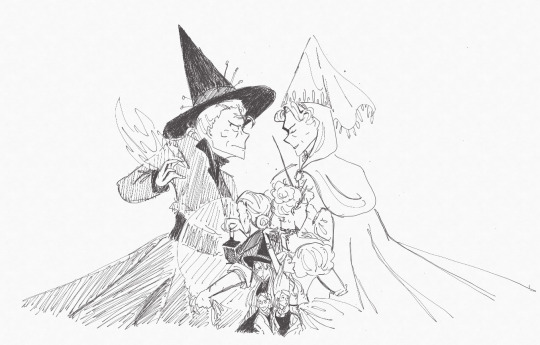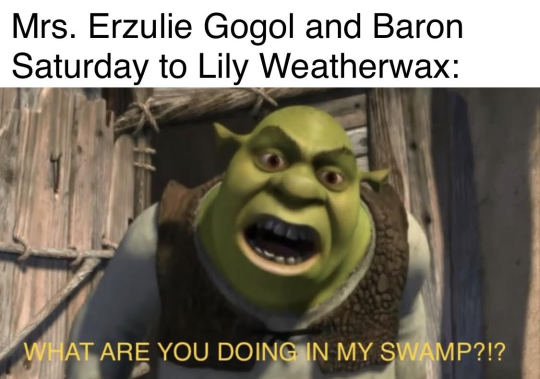#lily weatherwax
Text




Surely I can trick myself into using a small pen size if I do one of these ridiculous zoom-out evolution drawings?
#discworld#discworld fanart#gnu terry pratchett#featuring#granny weatherwax#esme weatherwax#lily weatherwax#lilith de tempscire#witches abroad#a friend mistook them for lesbians which made me do a spit take#but let me express my wholehearted love of old woman yuri in the tags - especially involving nanny#and do let me say I do enjoy some vicious sibling rivalry#I also do headcanon them as twins#although according to the wiki I'm probably wrong#granny has been pulling this same face since she was eight#maybe next thing I draw should be old woman yuri...
331 notes
·
View notes
Text
"It's daft, locking us up," said Nanny. "I'd have had us killed."
"That's because you're basically good," said Magrat. "The good are innocent and create justice. The bad are guilty, which is why they invent mercy."
"No, I know why she's done this," said Granny darkly. "It's so's we'll know we've lost."
"But she said we'd escape," said Magrat. "I don't understand. She must know the good ones always win in the end?"
"Only in stories," said Granny, examining the door hinges. "And she thinks she's in charge of the stories. She bends them around herself. She thinks she's the good one."
Terry Pratchett, Witches Abroad
#nanny ogg#magrat garlick#granny weatherwax#esme weatherwax#lily weatherwax#discworld#witches abroad#terry pratchett#witches#magic#stories#logic#justice#mercy#imprisonment#ethics#morality#good vs evil#winning#human nature#the invention of mercy#she thinks she's the good one
194 notes
·
View notes
Text
Rincewind vs Tymon
Samuel Vimes vs Lupine Wonse
Esmeralda Weatherwax vs Lily Weatherwax
it's the "we both started in the same place but we drifted too far apart and now i have to end you" dynamic
97 notes
·
View notes
Text


insane siblings saturday
#witches abroad#lily weatherwax#discworld#finn lê i'm gonna say outright this is finn lê bait they only appear in one book together#she has to be good because she chose to but she's so mad about it#granny weatherwax
144 notes
·
View notes
Text

#discworld#gnu terry pratchett#meme#discworld meme#created by yours truly#witches#witches abroad#lancre witches#lancre coven#granny#granny weatherwax#esme weatherwax#mistress weatherwax#lily weatherwax#witch#fairy godmother#spongebob
18 notes
·
View notes
Text
Lily "Lilith the Tempscire" Weatherwax vs. Lucy "Diamanda" Tockley
Lily "Lilith the Tempscire" Weatherwax:
Wielder of magic just as strong as that of her sister. Kicked out of the house at a young age for being proud, wilful, and wanton, she goes on to achieve greatness and power by amplifying her magic with mirrors. She thinks of herself as the Good One, the one who provides people with Happy Endings - whether they want that particular ending or not. How could that be bad?
Lucy "Diamanda" Tockley
Lucy Tockley is a teenage girl who dabbles in the occult and fashions herself a self taught witch. She calls herself "Diamanda" because it sounds more 'witchy'. For the same reason, she paints her nails black, and wears black lace and a floppy black velvet hat with a veil. Scorns the mundane and woefully stagnant ways of the established witches of Lancre. Her version of witchcraft is progressive and stylish.
20 notes
·
View notes
Text
Hold on a minute, I'm thinking.
So, Granny and Lily are mirrors of each other, yes?
They're sisters.
One is 'good' and one is 'bad', but they are actually very similar.
Their choices reflect their struggles, as they seek to be what does not naturally come to them.
Lily is surrounded by and uses mirrors.
Granny avoids mirrors.
Lily uses the mirrors to control the narrative, caring very little for what the people she forces into these situations want.
Granny breaks the narrative whenever she can and does so with empathy for the people she helps.
The final confrontation involves mirrors and results in the two become trapped inside the mirrors.
The way out of the mirrors is to understand who is the real you, to in short understand who you really are.
Lily does not escape and presumably forever searches for her true self among her reflections.
Granny escapes because she understands who she is: good and bad and everything inbetween.
I'm done thinking; I need to lie down.
#discworld#witches abroad#granny weatherwax#lily weatherwax#novels#y'all can reblog this if you want#words from alice#alice rereads
137 notes
·
View notes
Text
There's a bit in Witches Abroad where, for plot reasons, Magrat has to destroy a dress. It's a beautiful dress, and folklorically, it's Cinderella's dress. And there's a piece of narration about how Magrat's heart broke, because she had dreams of having a dress like that, one that fit her, one that was beautiful (one to make her beautiful).
And I really think that it was a greater sacrifice than I've ever seen talked about. Witches Abroad is largely talked about in the context of Esme and Lily, I don't tend to see Magrat discussed much. But Magrat is a young woman who grew up poor and became a witch, and she's gawky and awkward and feels herself to be unlovely. And as much as she puts flowers in her hair and takes time about her appearance, there's never a moment (to this point in the series) where we've seen Magrat really feel comfortable in her own skin. She won't get that for several books yet. She's the junior witch of the trio, and although she respects Nanny Ogg and Granny Weatherwax, we don't really see them respect her (yet).
And that dress represents a dream that is deeply personal. It represents, essentially, gender euphoria. Feeling lovely, wearing something beautiful made just for her. The dress represents the most secret desires of Magrat's heart. It's a trick, a trap, an enchantment, but it's enchanting because it knows exactly what she wants. And there is tragedy in Magrat making the very brave decision to tear it to shreds.
So much of Witches Abroad is about doing the right thing regardless of what a narrative thinks you should do. For Esme, it's being the good witch who knows herself and stands at the boundaries and doesn't lean on mirrors for power.
And Magrat's choice was part of breaking Lily's power. She doesn't get a lot of credit for making Choices in the way that Granny does in rejecting vampirism or like Tiffany in defeating the hiver. But this was a witches Choice none the less. Shred the dress, save the girl who got sucked into this because another witch made an evil choice. Responsibility before personal wants, as unfair as it is. And if that's not the core of witchery on the Disc, I don't know what is.
#magrat garlick#discworld witches#witches abroad#i just think Magrat deserves a lot more credit than she gets. i love her.#and eventually her dreams do come true (after a fashion)#i really love her bit in Lords and Ladies where she gets armor and chases off the Gentry
75 notes
·
View notes
Text
Witches Abroad thoughts...
A while ago I linked to a news article about plans to add a content note to reprints of Pterry's earliest works. This book needs one.
I get that Pterry was aiming to show that cultural differences aren't bad, they're just differences, and people are just people wherever you go. But it's all done through the eyes of two very English-coded ladies, one of whom is merrily traipsing around the Disc being an obnoxious tourist, while the other is grumpily struggling to admit that 'foreigners' might almost be acceptable sometimes. No one ever calls out Nanny Ogg for being rude and ignorant - it's just played for laughs, and even if we're meant to disapprove, there are no consequences for her behaviour - in fact, her behaviour ends up saving a village from a vampire, suggesting her ignorance is a net positive.
Plus every look at the non-English-coded characters and cultures is done from a very of-its-time colonial English stance - foreign is weird and foreigners eat things that are weird and unpleasant and it's okay to observe foreign cultures but best to go home and enjoy non-foreign things, even if you do take the long way home and see the elephant.
I did appreciate the little bit of Weatherwax family backstory we get, particularly Granny's seething rage at having been forced into the role of 'the good one' even as a child, to placate her parents in the wake of Lily's behaviour.
I wish we'd got to see more of the Genua magic system, although if Pterry had done that at the time, it still would have been done through that colonial lens. Maybe later-Pterry could have written that in a more respectful way? But this is probably my least favourite witches book, and it's a shame because generally I love the witches books.
24 notes
·
View notes
Note
I wanted to say this before but i chickened out and had an extreme case of the self-doubt and self-consciousness BUT ANYWAY MY BRAIN CAN'T KEEP ME DOWN, vash and knives have big granny weatherwax & Lilith de tempscire (older sibling assuming the younger sibling will turn out to be the good guy and prepping to take up the natural balance role as the bad guy, then getting mad when the younger sibling leans so hard into being the good guy and doing things For The Greater Good that they actually become the bad guy, leaving the older sibling to reluctantly be the good guy and seethe over how the younger sibling is totally wasting their role by not even being self-aware that that's what they are, THEY would've done it so much better than the younger sibling-) vibes. (Tho knives is the one that actually changed his name into something edgy like Lily lmao.) And this latest chapter really just confirmed it lol.
Hey I think only one of us is cringe here and it's the woman who can't stop talking about her own fanfiction on the internet. Like it's definitely me. Nothing cringe about making the fanfic posting experience rewarding by starting discussion about it with the highly enthusiastic author :)
I've read a bit of Discworld (which in Discworld terms is like 15+ books maybe lol?) but I haven't read the Witches series! But yeah that sounds super accurate lol. I think especially in the sense of telling a bigger, grander ur-story, and the characters having their predetermined roles in the story. I mean Vash is very much the Christ figure and Knives is very much the Devil. There's something mythological about them. Which is why Trigun especially is so much fun (and so challenging) to do a roleswap for: it's always interesting to put the Devil in the role of the messiah, and to make a messiah a demon. It's a puzzle that doesn't fit right, and that irreconcilability always makes for the most interesting stories.
The big thing of the story is 'choices'. (Just like Discworld is REALLY into!) Choices are huge in Trigun itself and it handles the topic in a way more interesting and nuanced way than I did lol, but the REALLY FUN thing about roleswaps is that it lets you explore how the choices we make change us as people and change our paths in life. What I wanted for this specific story is for Vash and Knives to basically be the exact same people as they are in canon, with the exact same natures and places in mythology. Knives wasn't meant to be good, and for him it's a series of active decisions almost every second of his life. He decided who he is. A big question asked throughout the story is 'what choices is Vash making, and to what extent is he choosing to be Like That?'. Yayyy foils lol.
(I forgot I'd read 15+ Discworld books. Wow, maybe it was an influence...)
#my writing#control freak vs guy so out of touch with reality that it's up in the air to what degree he's choosing The Mass Murders#fight. I guess.#one of the weak spots of stamp I think is that Vash like did make some choices#but none of them really meant anything or changed the outcome of the narrative#knives was basically 100% in control of the entire plot and Vash was never able to create significant change#leaves Vash feeling very passive and extremely wet cat#which I guess is the point in some ways - it's hard for a guy THAT suicidal to take control of his own life#but I find that a character making impactful choices is one of the most important things in any narrative#and when that's not there the narrative's always a lot weaker#which is why manga/98 vash is so much more compelling imho
14 notes
·
View notes
Text
I finished re-reading "Witches Abroad", and I am struck by how similar Esme and Lily Weatherwax are to Edalyn and Lilith Clawthorne. Of course their arcs are quite different, but I am suspecting that someone on the TOH writing team might have read Discworld.
Or it's just stories without relation having a similar shape.
#also duc is like. crowley-coded. he can't sit. he wears sunglasses. and the snake sisters can't walk.#discworld#witches abroad#the owl house#cawpost#caw caws
7 notes
·
View notes
Text
"You'd have done the same," said Lily.
"No," said Granny. "I'd have thought the same, but I wouldn't have done it."
"What difference does that make, deep down?"
"You mean you don't know?" said Nanny Ogg.
Terry Pratchett, Witches Abroad
#granny weatherwax#nanny ogg#lily weatherwax#witches abroad#discworld#terry pratchett#sibling rivalry#thoughts#actions#motivation#morals#ethics#the difference#not the same
1K notes
·
View notes
Text
Person: says something annoying
Munstrum Ridcully: (sighs) for now you'll be a frog. come visit me next time.
The Dean: You are now a frog, Yo.
Esme Weatherwax: what if you thought you were a frog :D
Lily Weatherwax: you are now a frog and also a prince 😗
.....
bonus
Gytha Ogg: oh i see you got turned into a frog. Bet you could do a lot with that tongue now 😏
6 notes
·
View notes
Text

Carole Lombard and John Barrymore in True Confession (Wesley Ruggles, 1937)
Cast: Carole Lombard, Fred MacMurray, John Barrymore, Una Merkel, Porter Hall, Edgar Kennedy, Lynne Overman, Irving Bacon, Fritz Feld, Hattie McDaniel. Screenplay: Claude Binyon, based on a play by Louis Verneuil and Georges Berr. Cinematography: Ted Tetzlaff. Art direction: Hans Dreier, Robert Usher. Film editing: Paul Weatherwax. Music: Friedrich Hollaender.
A somewhat too frantic screwball comedy, True Confession plays fast and loose not only with the legal profession but also to an extent with the careers of its stars. Fred MacMurray plays Kenneth Bartlett, a lawyer who insists on defending only those he thinks are really innocent, which gives him some trouble when his wife, Helen (Carole Lombard), goes on trial for murder. She's a would-be writer who can't always be trusted to tell the truth, so even though she didn't commit the crime, she winds up saying she did and pleading self-defense. Meanwhile, the trial is being watched by Charley Jasper (John Barrymore), an alcoholic loon who knows who really did the deed. None of these people make much sense, especially Barrymore, who seems at times to be reprising his earlier, far more successful performance as Oscar Jaffe opposite Lombard's Lily Garland (aka Mildred Plotka) in Twentieth Century (Howard Hawks, 1934). Alcohol had taken a serious toll on Barrymore, who was 55 when he made this film; he looks 70. Lombard was better, more controlled in her comic flights in Twentieth Century, too. Here she verges on grating at times. Comparisons are seldom fair, but it has to be said that the difference between the two films has to be that the earlier and better one was directed by Hawks from a screenplay by Ben Hecht and Charles MacArthur, and True Confession was directed by Wesley Ruggles from a screenplay by Claude Binyon based on a French farce. Still, there's some fun to be had here, and the cast includes such stars from the golden age of character actors as Una Merkel being giddy, Porter Hall being irascible, Edgar Kennedy doing multiple face-palms, and Hattie McDaniel playing one of her always watchable (if regrettable) roles as the maid.
2 notes
·
View notes
Text

#discworld#gnu terry pratchett#meme#discworld meme#created by yours truly#witches abroad#witches#genua#erzulie gogol#mrs gogol#baron saturday#lily weatherwax#shrek
22 notes
·
View notes
Text
Lily "Lilith the Tempscire" Weatherwax vs. Petulia Gristle
Lily "Lilith the Tempscire" Weatherwax:
Wielder of magic just as strong as that of her sister. Kicked out of the house at a young age for being proud, wilful, and wanton, she goes on to achieve greatness and power by amplifying her magic with mirrors. She thinks of herself as the Good One, the one who provides people with Happy Endings - whether they want that particular ending or not. How could that be bad?
Petulia Gristle
Petulia is a friend of Tiffany Aching and is being tutored by "Old Mother" Blackcap. She is particularly talented with pigs and, as a result, gains the nick-name "the pig witch". Her talent also wins her a spot at the Witch Trials, where she performs the pig trick. What this trick actually is is not revealed. She is a member of the coven set up by Annagramma Hawkin. When with the coven, she has a tendency to mumble, stutter, and be extremely deferential, but when at work, she becomes self-confident and secure. This latter tendency appears to have found her a husband, the sort of stolid Lancre pig-farmer who values a woman's ability to tuck a pig under each arm, treat their ailments, and finally convert them to all the things pork is prone to becoming. Petulia is an expert at Pig-Boring, which is the most humane way of slaughtering an animal prior to sausage and bacon-hood. She simply chooses her animal, and then talks to it in a most earnest monotone voice about trivial things of parochial importance until its eyes close and it slumps to one side, having by then given up the will to live.
13 notes
·
View notes